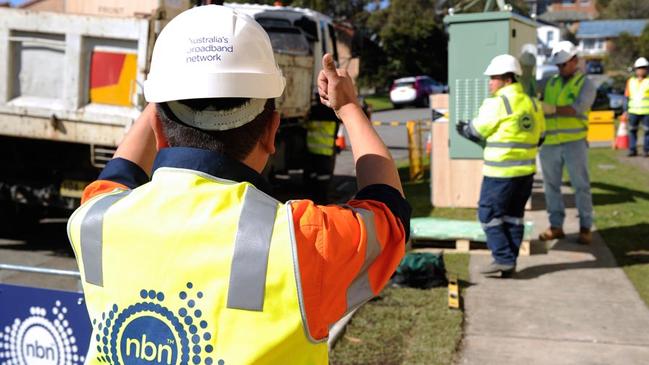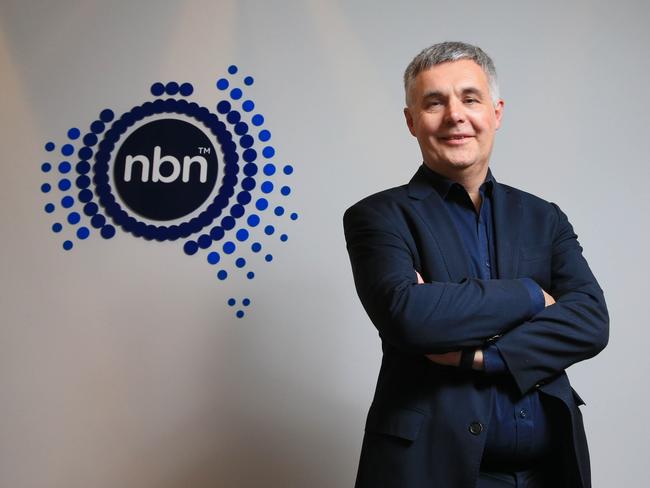NBN is putting a ‘speed tax’ on broadband in Australia, and failing to meet targets, inquiry hears
The multibillion-dollar network designed to deliver high-speed broadband in Australia may force more people on to fast mobile plans, an inquiry has heard.
NBN
Don't miss out on the headlines from NBN. Followed categories will be added to My News.
Far from elevating Australia’s internet credentials, the National Broadband Network had put an “artificial handbrake” on fast download speeds, raised the price of accessing the internet, and repeatedly failed to meet its own revenue targets, a parliamentary inquiry into the $51 billion network heard today.
And the damaging claims came just days after Telstra made the unprecedented decision to stop selling high-speed broadband plans to some NBN users due to poor customer experience.
But NBN Co chief executive Stephen Rue rejected claims at the inquiry, saying users should stop focusing on internet speeds and technology, and should instead focus on what they could do with the network after its completion.
The latest NBN complaints came at the first public hearing of a Joint Standing Committee inquiry into NBN’s business case and services to small businesses.
Vodafone chief strategy officer Dan Lloyd spearheaded a charge for changes to the NBN’s pricing structure, saying users were being slugged too much to access broadband and particularly high-speed plans.
“Our view, which is shared by many others in the industry, is that NBN’s CVC charge is a speed tax on NBN customers and it must be abolished,” he said.
“There are many open-access fibre networks in the world but only NBN has sought to introduce an artificial handbrake on the performance of its network.”

Mr Lloyd said the price of delivering broadband at the “same speed” to customers over the NBN had increased by 50 to 60 per cent since 2011, and as many as 40 per cent of Australia’s internet users would consider using a mobile service, such as 5G, if high prices remained.
“If costs continue to go up for retailers to sell the same speed service on the NBN, the industry will find substitutes to meet the increasing customer demand for broadband, including 5G,” he said.
“Indeed, some retailers have already made the decision to bypass the NBN by offering wireless alternatives.”
Those retailers could include Telstra, which this week unveiled further investment in 5G mobile technology.
The telco, which declined to appear at the inquiry, also revealed it would stop selling 100 megabit per second plans to NBN customers using fibre-to-the-node, curb or basement technology, with chief executive Andy Penn saying testing and downgrading users was “causing too much pain” for users.

But Mr Rue defended the infrastructure project, arguing that retailers and users should focus less on download speeds and comparisons with services in nearby nations like New Zealand, and more on what it could do for society.
“We hear consistently that the network is not a good network that we’ve built but if you actually compare it to nations overseas, to European nations, we’re actually doing very well,” he said.
“What I would like to see is people talk about is how we can use this network for the benefits of the economy and the benefits of society. That’s what I’d like the focus to move to rather than comparing specifically across technologies.”
Mr Rue was also questioned on NBN Co’s finances, including the fact that it had missed two of its three most recent annual revenue targets, forcing them to be “aggressively” lowered.
But he said the company was still operating within a “contingency” built into its original figures, which would have allowed the network to cost as much as $56 billion.
“These are not targets that are easy to achieve,” Mr Rue said.
“You’ve got to look at it on a project basis and you’ve got to take into account contingencies rather than looking at it on a line-by-line basis.”
NBN Co had also begun investigating options to borrow an extra $2 billion from private firms, Mr Rue said, to cover cost blowouts caused by HFC problems and fibre-to-the-curb upgrades.
Originally published as NBN is putting a ‘speed tax’ on broadband in Australia, and failing to meet targets, inquiry hears

